Undergraduate Research Day
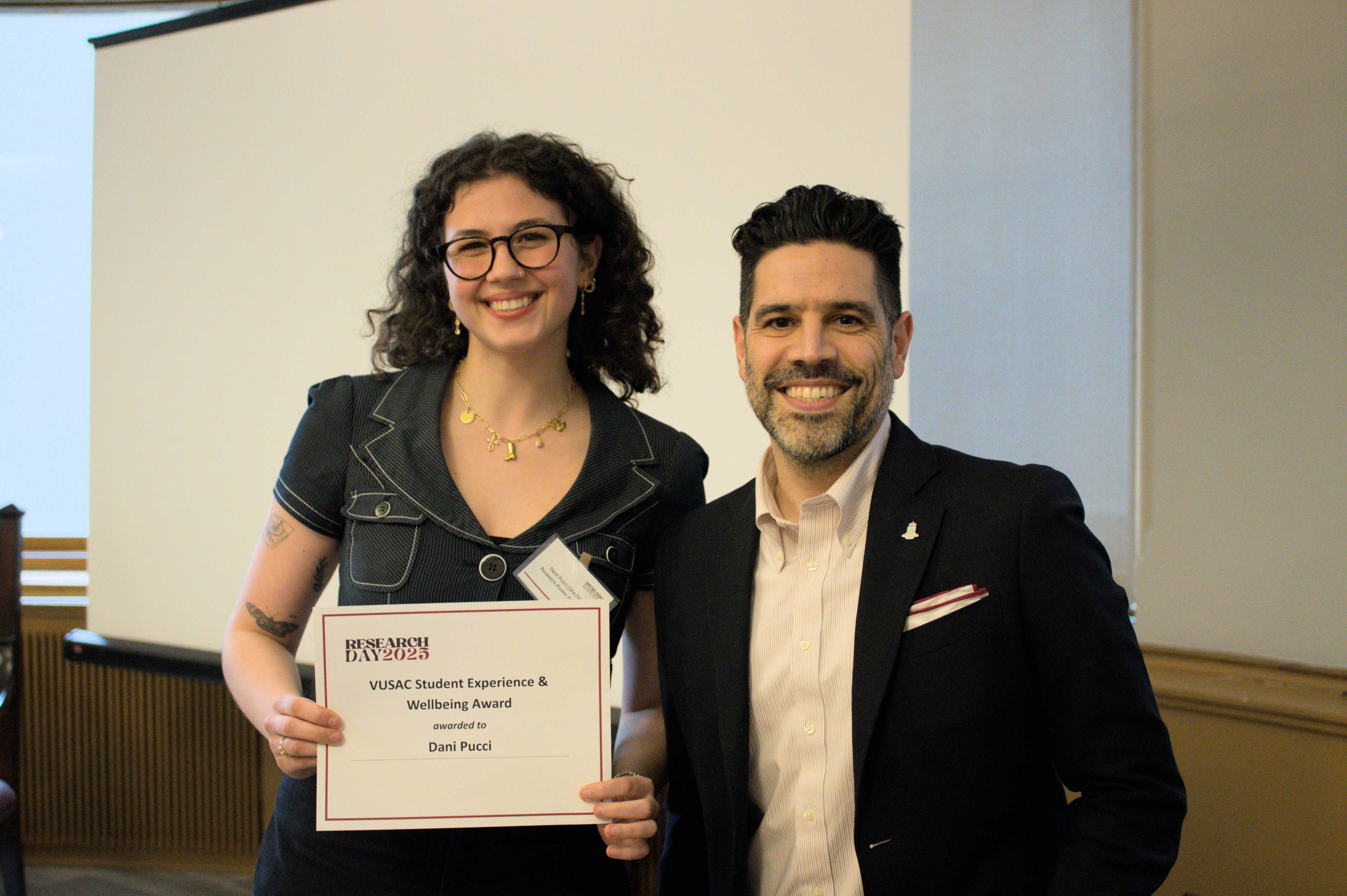
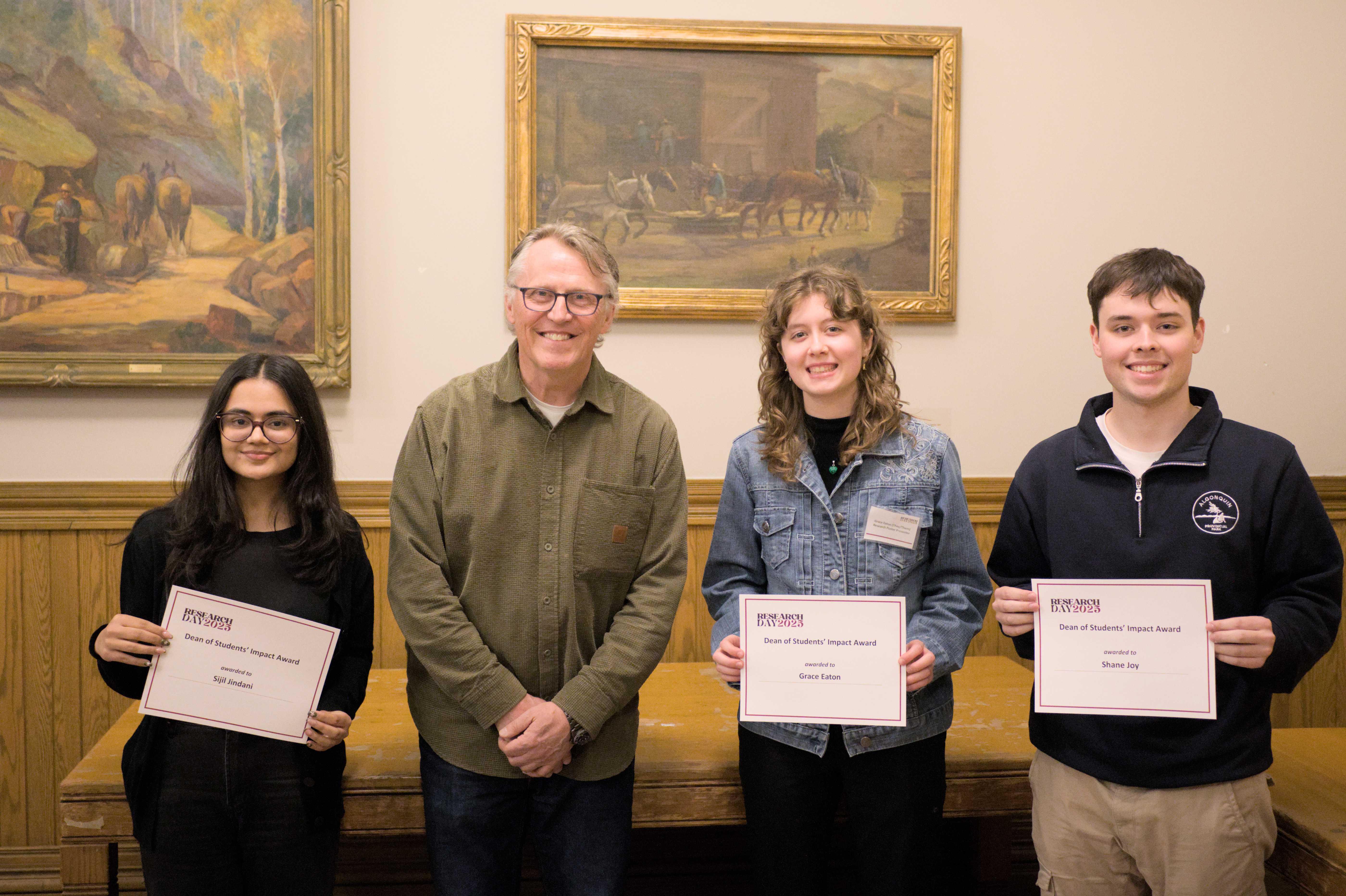
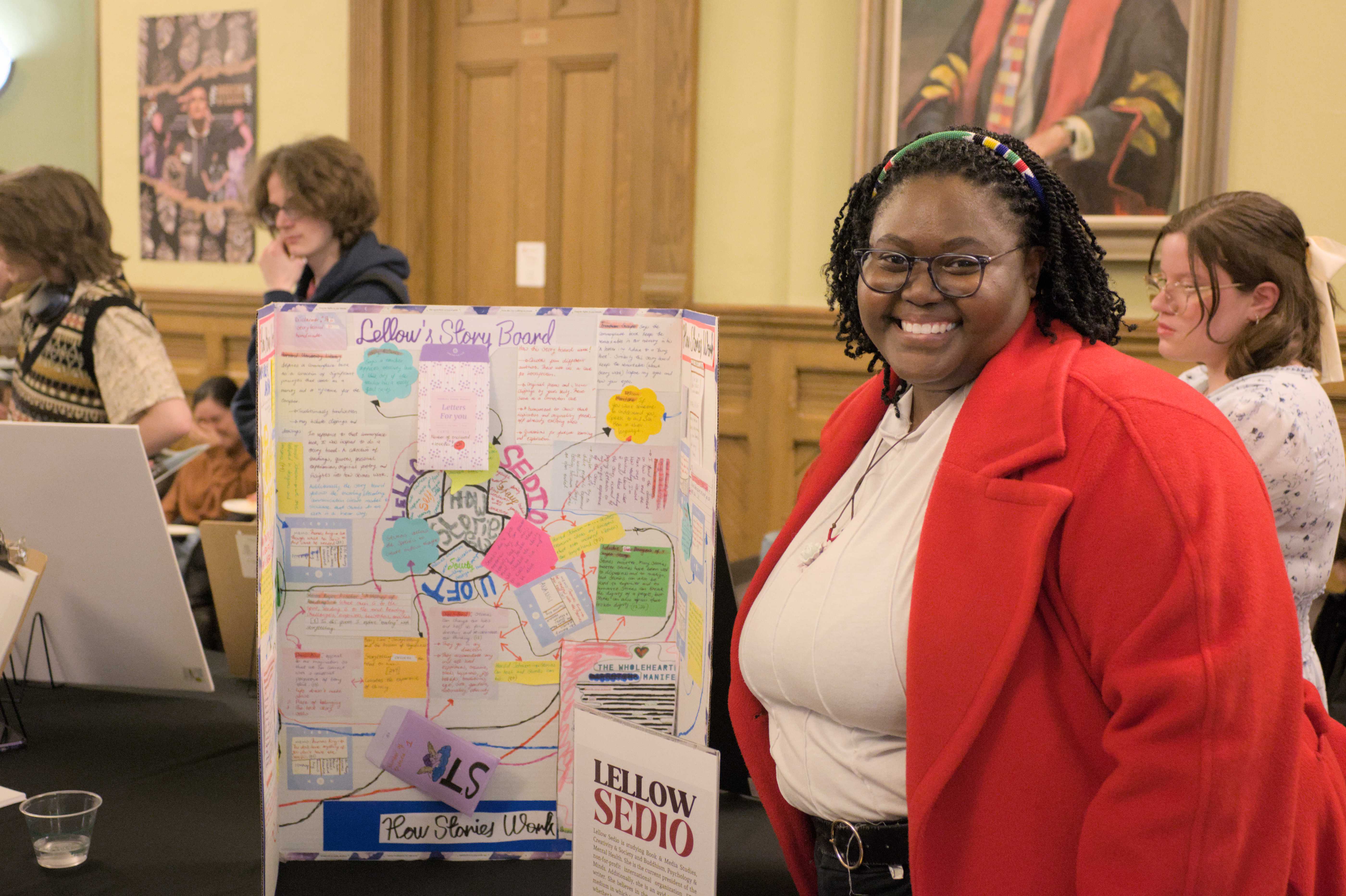
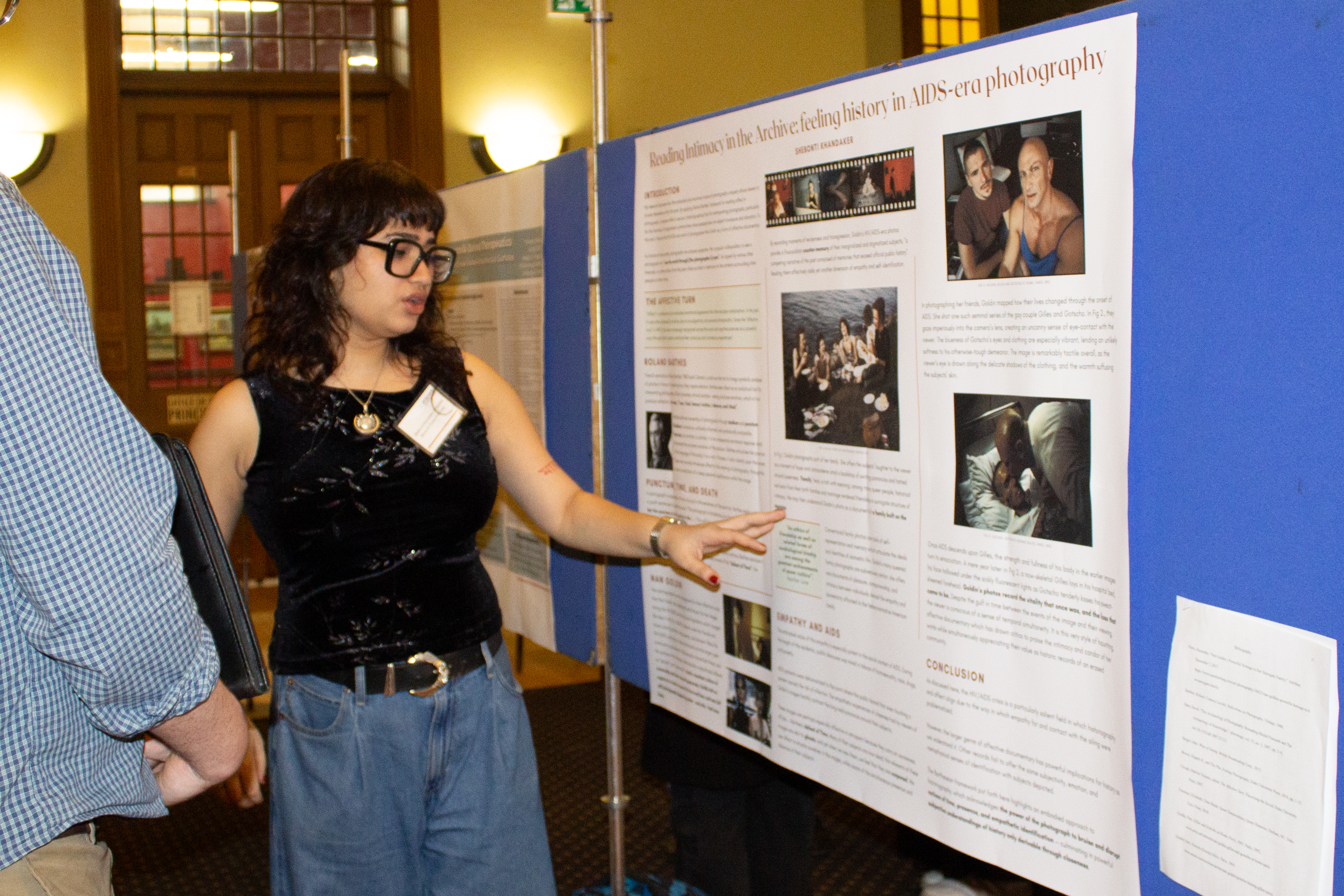
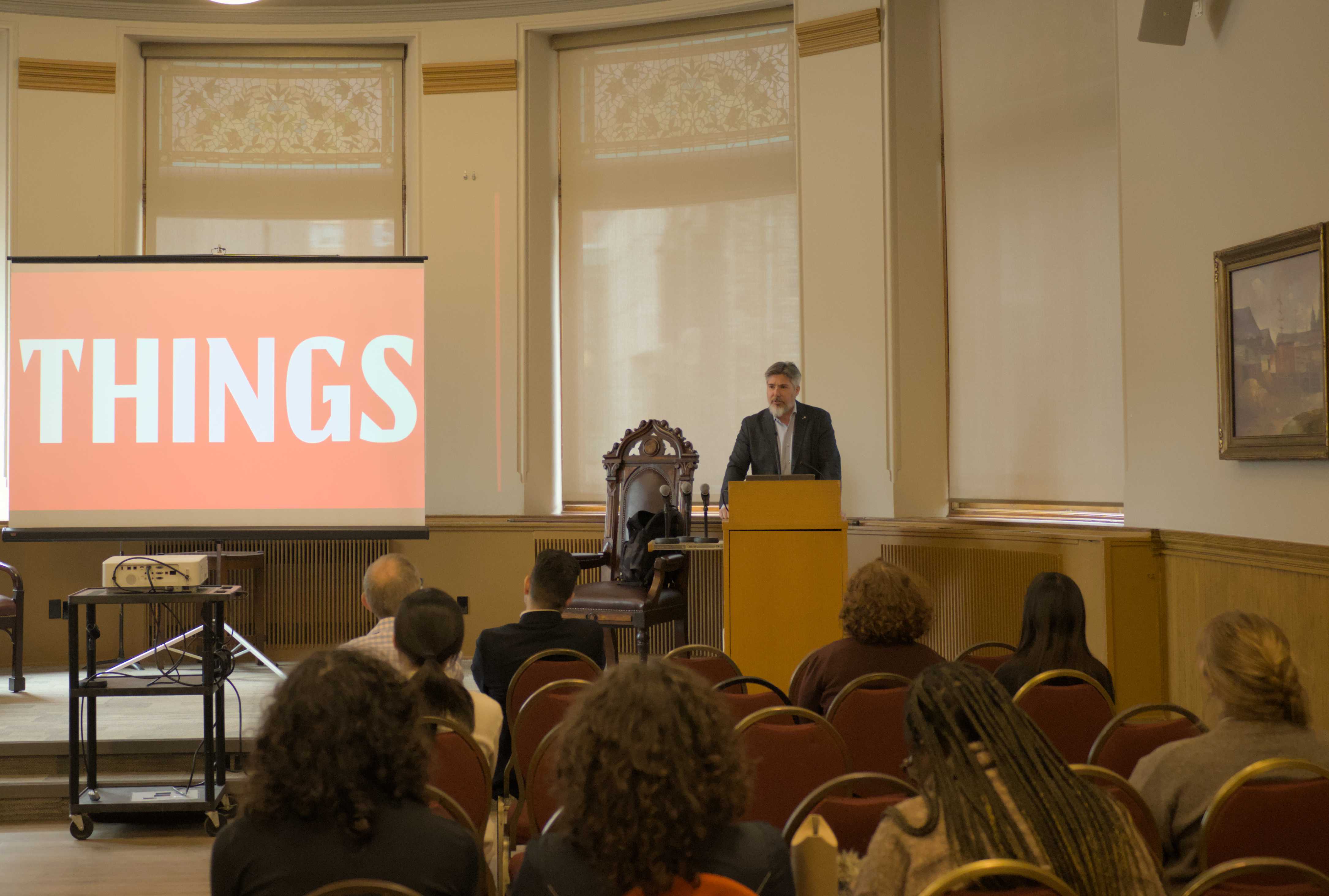
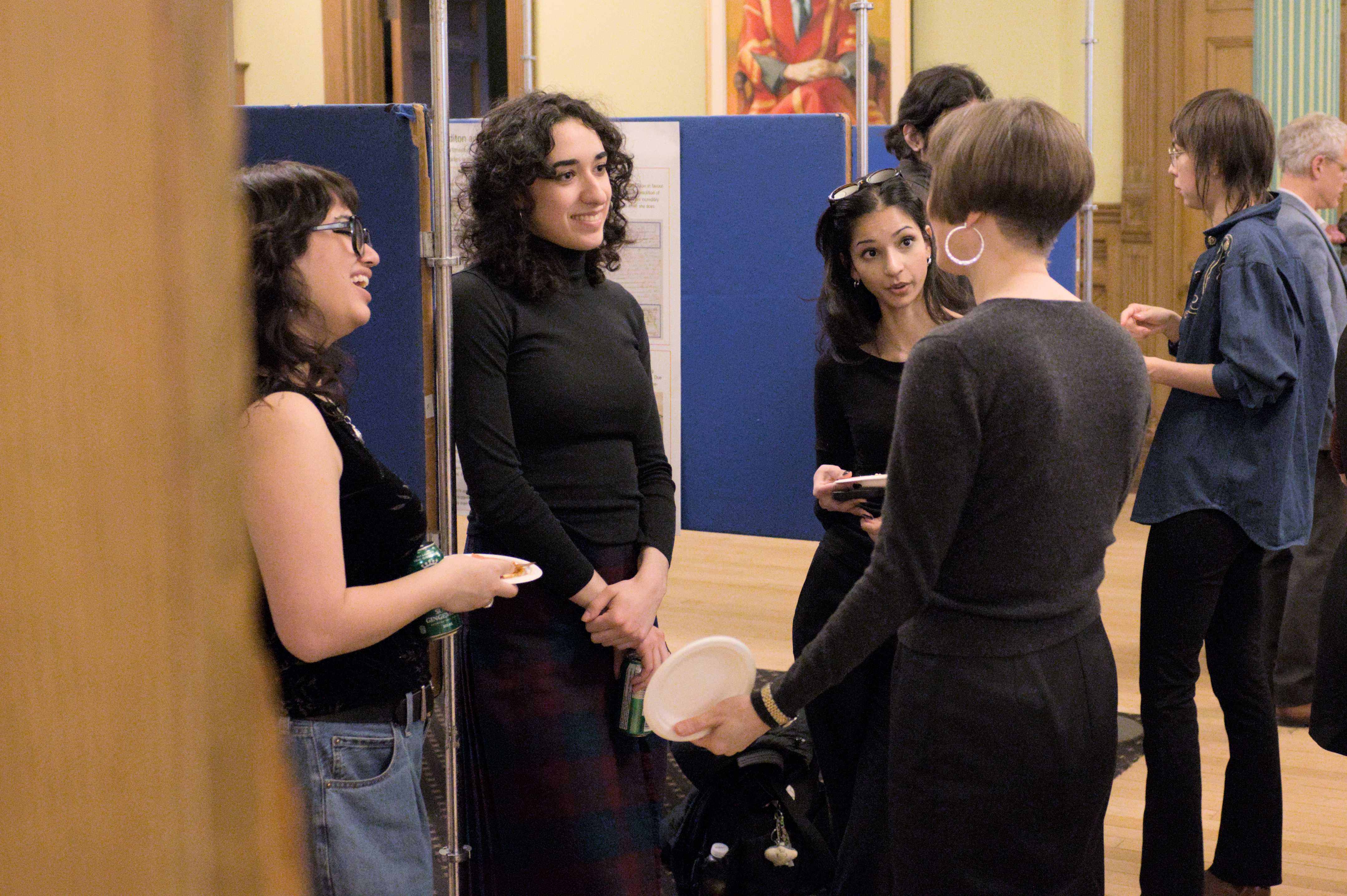
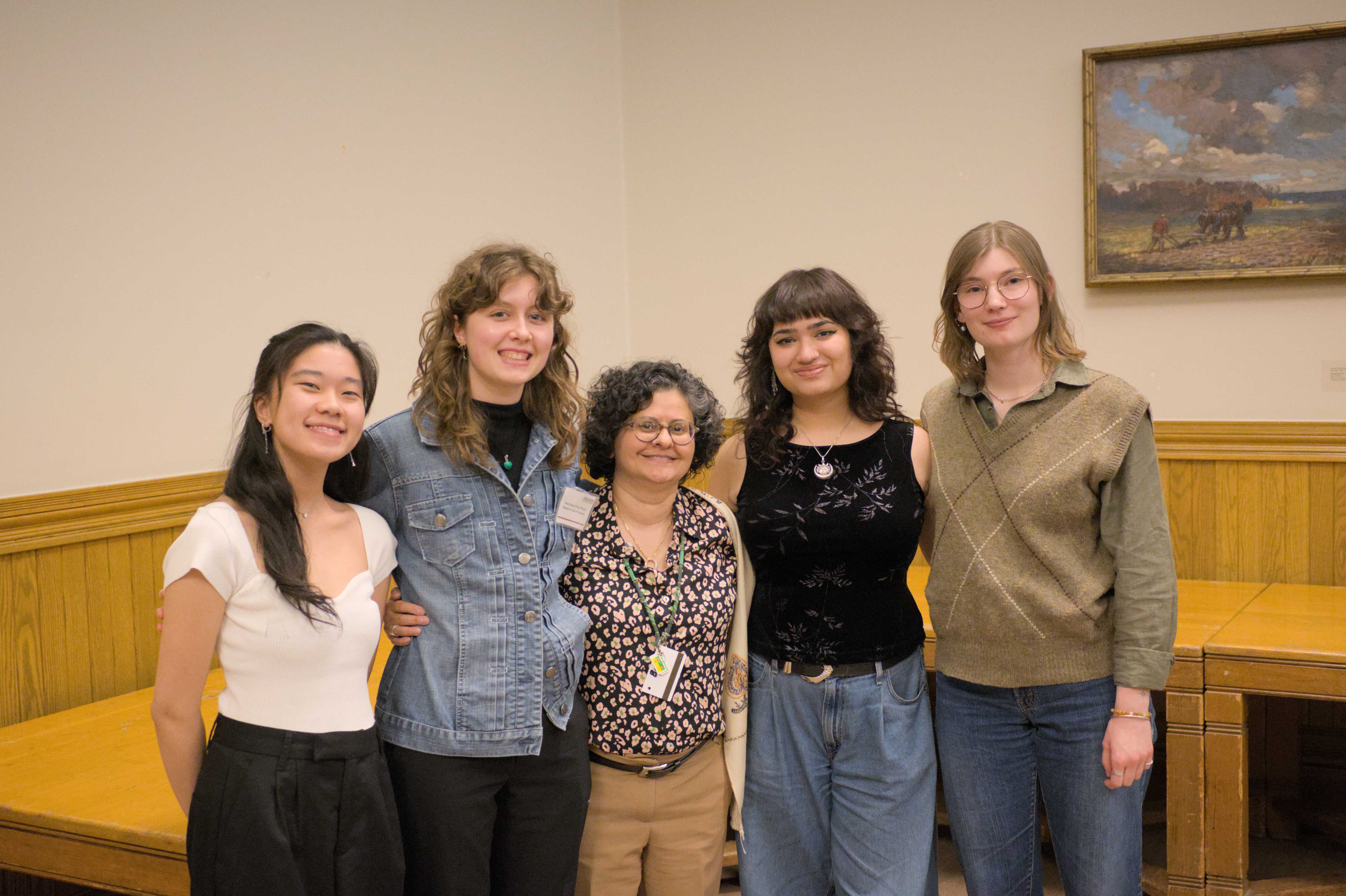
Research Day 2025 Prize Winners
Thanks to everyone who participated in Victoria College’s Undergraduate Research Day 2025. Congratulations to the following students, whose work was chosen by judges from various units at the college for special recognition.
Dean of Students’ Social Impact Awards
Advocate or Assimilator? Egerton Ryerson’s Role in Shaping Indigenous Education in 19th-Century Upper Canada
Shane Joy
This research explores Egerton Ryerson’s shifting views on Indigenous education in Upper Canada from the 1820s to 1840s. Initially supportive of Indigenous rights and self-determination, Ryerson later endorsed industrial boarding schools aimed at assimilating Indigenous children. Using his correspondence, Methodist records, and government documents, this study situates Ryerson’s transformation within broader Methodist, governmental, and Indigenous discourses. It argues that his 1847 report reflected a convergence of interests that framed education as a tool for survival but ultimately advanced colonial assimilation. This project contributes to understanding the complex foundations of Canada’s residential school system and the tensions shaping 19th-century settler-Indigenous relations.
Technology and the Border-Industrial Complex at the San Diego-Tijuana Border
Sijil Jindani
This project explores the topic of technology and the companies involved with it at and around the San Diego-Tijuana border. It questions the concepts of borders and nation-states and traces the connections between border policy and the growth of the defense industry. It uses primary and secondary research to discuss how the technology industry contributes to and continues to uphold the militarization of the border. It argues that the nexus of the defense and technology industries and their economic agendas influence the lives and realities of people situated around the borders.
Palimpsest: A Queer Memoir
Grace Eaton
"Palimpsest" is an experimental book-length memoir about my life and family history. It explores themes of queerness, class, and disability, revealing how disenfranchised experiences shape our relationship to time. Formally, it is nonlinear—with nonchronological anecdotes written from multiple perspectives—and genre-bending, crossing boundaries of speculative fiction and nonfiction realism (ex: the character “the Shadow” is a symbol for intergenerational trauma). Overall, it is a life-affirming queer story of resilience: an essential narrative as far-right anti-LGBTQ+ hatred is so pervasive. This year, I completed two drafts of the work and intend to continue editing it towards publication after graduation.
Fundamental Fairness Beyond Legal Counsel: Envisioning a Less Lawyer-Centric Refugee Status Determination System in Canada
Artin Khiabani
This research compares how Canada and Germany determine who qualifies as a refugee. Canada’s system relies heavily on legal representation, disadvantaging claimants who cannot afford quality lawyers and prolonging wait times to an average of 24 months. In contrast, Germany’s caseworker-driven model minimizes financial strain and ensures faster decisions. This study argues that Canada could improve fundamental fairness, both in process and outcomes, by adopting a system similar to Germany’s, where trained officials guide claimants through the process. Reducing reliance on lawyers would make refugee decisions more accessible, efficient, and equitable for those seeking protection.
E.J. Pratt Library Primary Source Research Prize
AWARD FOR SOCIAL SCIENCE:
Narratives of Resilience from the Thai-Myanmar Border
Natalie Lau
Since the military coup in Myanmar in 2021, throngs of migrants have fled to Thailand, where they continue to reconcile with loss while negotiating survival and belonging in a new society. This research consists of some 20 interviews with various actors in the mosaic of cross-border migration, including people who worked in Parliament in Myanmar, informed Thai immigration policy, a descendent of Shan royalty, and various academics, students, businessmen, artisans, teachers, Buddhist monks, Christian missionaries, and leaders of local and international NGOs. In recording these stories, this research seeks to preserve a historical and cultural memory of defiance threatened by erasure.
E.J. Pratt Library Primary Source Research Prize
AWARD FOR HUMANITIES:
Eva Kushner: A Lifetime of Letters
Arlo Grzyb-Reed
"A Lifetime of Letters" centres around the materiality of academic communication, archives, and the technological evolution of correspondence. I utilize primary source research conducted through my internship with E.J. Pratt’s Special Collections Archivists, drawing on the professional archives of Eva Kushner, the first female president of Victoria College. Through Kushner’s unprocessed records, I track the evolution of academic correspondence from the 1940s to the late 2010s. I examine the materiality of seven evolutionary milestones while duly incorporating Kushner’s lived experiences as both an immigrant and female scholar during a century of rapid social, political, and technological change.
Principal’s Science Award
Using Stem Cell-Derived Brain Organoids to Model Myelination and Demyelination
Hannah Consunji
Myelin - the insulating sheath surrounding neurons in the nervous system - ensures rapid impulse propagation and is essential for maintaining cognitive function. As the demyelination mechanism is incompletely understood and we lack human models to interrogate this process, disorders where myelin is lost (i.e. multiple sclerosis and adrenoleukodystrophy) lack effective treatments. My lab created a central nervous system model using stem-cell-derived 3D cultures to elucidate the role of the brain’s resident immune cells, microglia, in this process. In the future, this will be used to screen for pharmacological and cellular therapies to prevent inflammation and demyelination, or promote remyelination.
Science, Technology and Society Award
Through the Looking Glass: PLATO Spectacles and the Birth of Augmented Reality
Ava Spurr
What do you do when you come across an object you’ve never seen before? During my research with the University of Toronto’s Scientific Instruments Collection (UTSIC), I had to figure just that out when I encountered a pair of PLATO Visual Occlusion Spectacles. Designed by Paul Milgram in the 1980s, these goggles were a groundbreaking piece of augmented reality (AR) technology. Using liquid crystal lenses, they allowed researchers to control when and how visual information was presented, manipulating perception in ways that foreshadowed modern AR devices. Through observation and analysis of Milgram’s work alongside foundational texts on human-computer interaction, my research explores how these early AR systems shaped contemporary user experience design. This study also emphasizes the crucial role of collections like UTSIC in preserving both artifacts and the rich technological history they embody.
Student Choice Award (Voted on by U of T community)
Intimacy in the Archive: feeling history in AIDS-era photography
Shebonti Khandaker
What does it mean to ‘feel’ history? This paper explores how the subjective and affective nature of photography allows viewers of an image to understand and situate themselves within the past. Drawing on theorist Roland Barthes’s framework for reading photography, affect is posited as a potent historiographical tool for reinterpreting photographs. This is particularly pertinent in exploring the histories of marginalized communities, whose perspectives are vulnerable to erasure and alienation. The paper applies this framework to the HIV/AIDS-era photography of Nan Goldin, positing it as a form of affective documentary which contributes to a nuanced understanding of historical experiences.
Material Culture and Semiotics Program Prize
Intimacy in the Archive: feeling history in AIDS-era photography
Shebonti Khandaker
What does it mean to ‘feel’ history? This paper explores how the subjective and affective nature of photography allows viewers of an image to understand and situate themselves within the past. Drawing on theorist Roland Barthes’s framework for reading photography, affect is posited as a potent historiographical tool for reinterpreting photographs. This is particularly pertinent in exploring the histories of marginalized communities, whose perspectives are vulnerable to erasure and alienation. The paper applies this framework to the HIV/AIDS-era photography of Nan Goldin, positing it as a form of affective documentary which contributes to a nuanced understanding of historical experiences.
VUSAC Student Experience and Wellbeing Prize
Episodic Disability and Accommodation Access at Ontario Post-Secondary Institutions
Dani Pucci
Pursuing post-secondary education presents challenges for young adults, marking a pivotal transition to adulthood. For some, health conditions and new diagnoses add complexity, introducing unique social, educational, and emotional obstacles. This study examines how Ontario post-secondary institutions define, address, and support students with episodic disabilities (EpDs) in accommodation processes. Often, policy operates on a temporary versus permanent disability binary, leaving students with EpDs uncertain about their eligibility. By analyzing institutional policy alongside student perspectives, the research examines the challenges students with EpDs face when seeking accommodations. Ultimately, the findings aim to amplify the voices of students with EpDs, informing more inclusive and responsive practices in post-secondary institutions.
Victoria College’s annual Undergraduate Research Day took place on Monday, March 31, 2025. Research Day brought together students from all disciplines to share their work with fellow students, professors, and the Vic community.
View in Full ictoria College’s annual Undergraduate Research Day took place on Monday, March 31, 2025. Research Day brought together students from all disciplines to share their work with fellow students, professors, and the Vic community.
Students created poster presentations to exhibit in the foyer of Old Vic and had the chance to discuss their presentations with expert judges from various units across the college. The event culminated with a keynote presentation, award ceremony, and catered reception. Prizes were sponsored by various departments, including the Dean of Students Office, the Office of the Principal, E.J. Pratt Library, VUSAC, the Material Culture and Semiotics program, and the Science, Technology, and Society program.
See the full program for Research Day 2025 here.
Please contact vic.research@utoronto.ca with any questions.
10 a.m. – 4 p.m. | Interdisciplinary Poster Session
Interdisciplinary Poster Session
Location: A.B.B. Moore Foyer
Posters will be presented by selected Vic students or any students enrolled in Victoria College programs who have been conducting research in any discipline. Come by and learn about the exciting research happening across undergraduate courses.
1 p.m. – 2:30 p.m. | NFC Undergraduate Fellows Symposium
Northrop Frye Centre Undergraduate Fellows Symposium
Location: VC102
Come and learn about the exciting work being done by undergraduate fellows at the Northrop Frye Centre.
2 p.m. - 4 p.m. | Material Culture and Semiotics Symposium
Location: VC211
Learn about ancient divination bones, Indigenous writing systems, historic military uniforms, museum exhibition strategies, contemporary photography and pro-wrestling.
2:30 p.m. – 4 p.m. | Capstone Humanities Symposium
Location: VC102
Learn from upper-year students in the capstone courses VIC451H1 Learning Communities and Higher Education and VIC493H1 Research Colloquium about their experiences of designing and implementing research on practices of mentorship and the interdisciplinary humanities.
4 p.m. – 5 p.m. | Keynote Address | “Critically Making Impact” Professor Matt Ratto
Research Day Keynote Speaker: Professor Matt Ratto
Critically Making Impact
Location: Alumni Hall
There are many forms of making within the academy. Some are focused on supporting learning and reflection, deconstructing our social, technological, and political systems to better understand how they weave together social and material concerns. Others seek to intervene more directly in these systems, constructing new weaves to address local or global issues. In this talk I address the complexity of critical practices, using my own “making” projects from the last 20 years to frame the possibility - and the difficulties - of positive change as enacted through vectors that include creative, scholarly, and material work. My goal here is to highlight the diversity of forms of impact and the positive role played by the creative application of critical humanities knowledge.
Matt Ratto is a Professor and Associate Dean Research in the Faculty of Information at the University of Toronto and the Bell University Labs Chair in Human Computer Interaction. He studies and practices ‘critical making’, work that combines humanities insights and engineering practices and has published extensively on this concept across a wide range of disciplines including the digital humanities, human-computer interaction, design, and Science and Technology Studies. Current projects include conceptual and technical explorations of ‘humanness’ within generative AI conversational agents and community-based research on energy transitions and vulnerable populations. Matt is always ready to speak with students interested in the intersection of Science and Technology Studies, Human-Computer Interaction, AI, and critical social perspectives.
5 p.m. – 6 p.m. | Awards Ceremony
Awards Ceremony
Location: Alumni Hall
Prizes:
- Dean of Student’s Social Impact Award
Awarded to projects demonstrating potential for positive social impact. - E.J. Pratt Library Primary Sources Prize
Awarded for the exemplary demonstration of primary source literacy, or the “abilities needed by researchers to conceptualize, find, analyze, and use primary sources.” (Guidelines for Primary Source Literacy, 2018). One Humanities prize and one Social Sciences prize will be awarded in 2025. - Principal’s Science Prize
Awarded to projects demonstrating excellence in any area of the sciences. - Science, Technology, and Society Program Prize
Awarded to projects involving some consideration of the relationship between Science, Technology, and Society. - Material Culture and Semiotics Program Prize
Awarded to a poster presentation that demonstrates a connection to the Material Culture and Semiotics program, such as an object-centred project or a project that employs semiotic theory, as well as scholarship related to the field, originality and creativity. - Victoria College Student Choice Research Prize
Awarded to the project receiving the highest number of student votes. - VUSAC Student Experience & Wellbeing Award
Awarded to projects that consider the university as an institution and the experience of students or student communities within it. Such topics might include but are not limited to, student organizations and organizing, student success or wellbeing, the institution of the university on a national or international scale, or issues of equity and diversity as they relate to undergraduates. Research that aligns with the overarching themes of community, pedagogy, and student life is eligible to be considered for this prize.
6 p.m. - 8 p.m. | Research Day Reception and Creativity and Society (C&S) “Nuit Blanche” Takeover
Location: ABB Moore Foyer and First Floor Classrooms
Join us for a catered reception to mark the end of Research Day 2025, and a celebration of work by students in the Creativity and Society program.
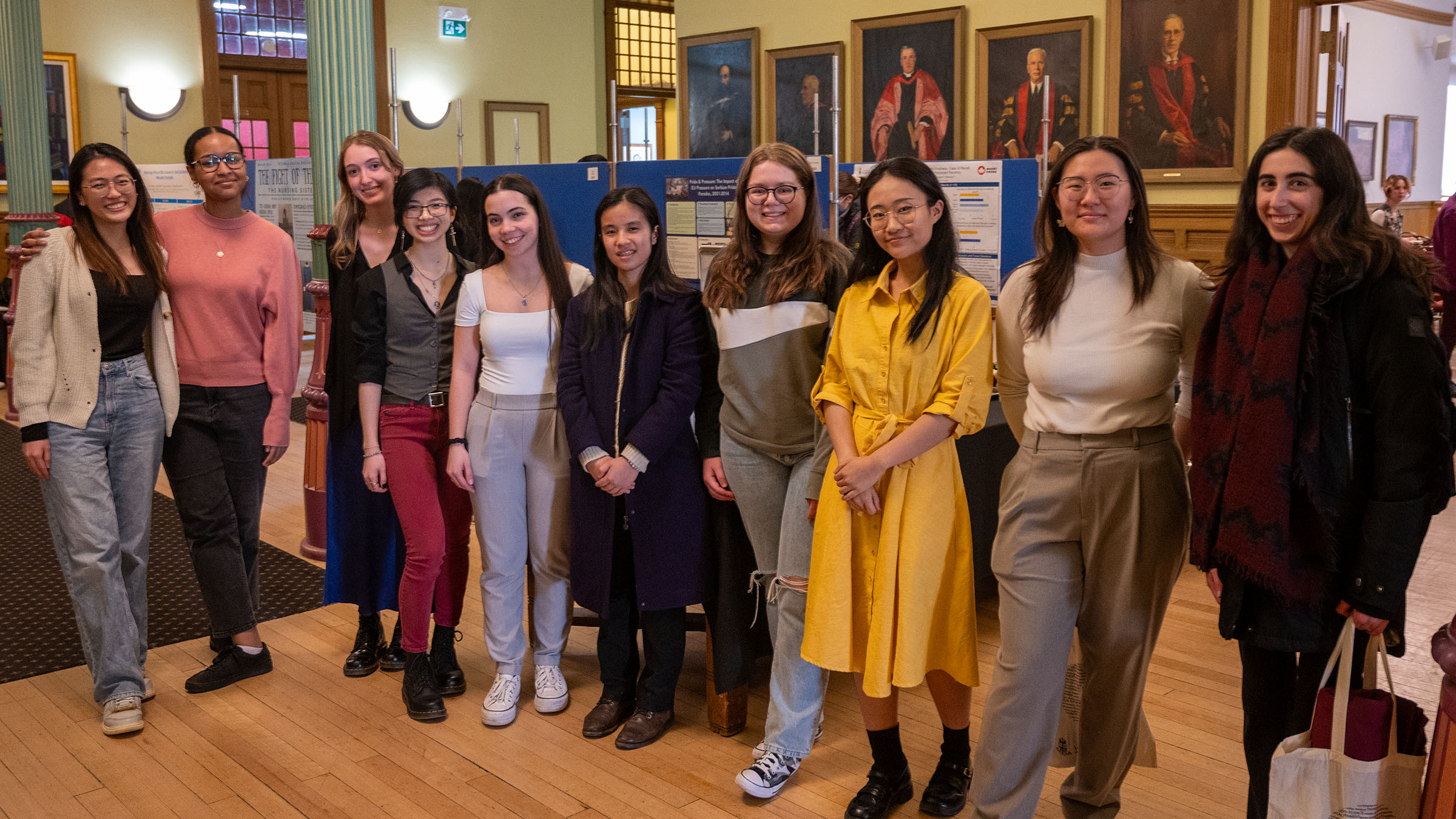
Past Research Days
March 25, 2024 | Research Day 2024
Location: Victoria College Alumni Hall/ Foyer
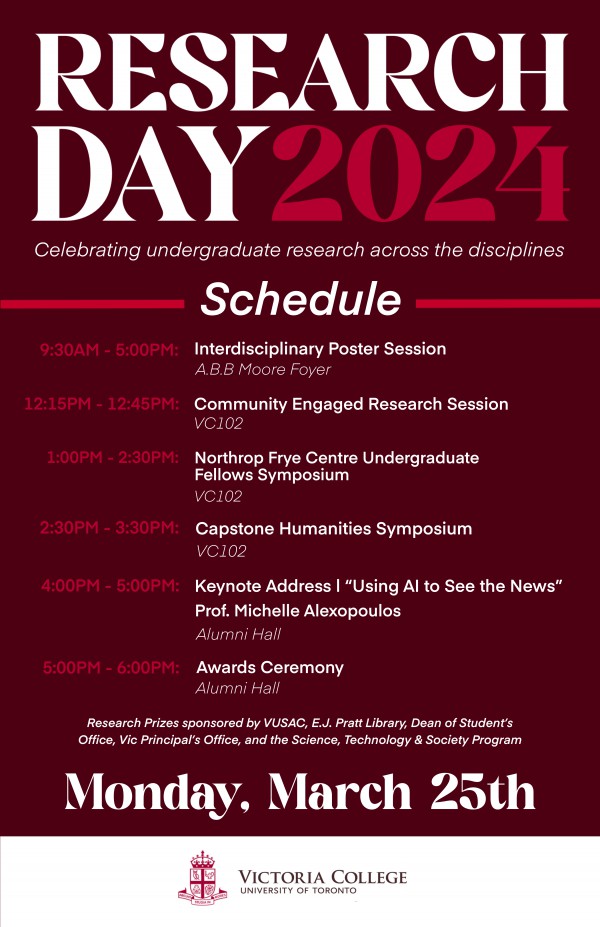
Program
9:30 a.m. – 5 p.m. | Interdisciplinary Poster Presentations
Location: A.B.B. Moore Foyer
Selected Vic students or any students enrolled in Victoria College programs who have been conducting research in any discipline will present their research posters.
12:15 pm - 12:45 pm | Community Engaged Research Seminar
Location: VC102
Presenters: Elisabetta Canaletti, Jejjy Bajwa
1:00 p.m. – 2:30 p.m. | NFC Undergraduate Fellows Symposium
Location: A.B.B. Moore Foyer
Presenters: Maneula More Castillo, Samantha B.W. Corrente, Sara Hashemi, Joël Ndongmi, Seavey van Walsum
2:00 pm - 4:00 pm | Material Culture and Semiotics Symposium
Location: VC101
Presenters: Josefina Novoa Reategui, Deena Skirkool, Amy Rogers, Tara Downie, Eunice Der, Mark Begnell, Milena Pappalardo
2:30 p.m. – 3:30 p.m. | Capstone Humanities Symposium
Location: VC102
Presenters: Zainab Azim, Samir Mechel, Palvasha Khan, Celine Hajj Sleiman
4 p.m. – 5 p.m. | Keynote Address
Location: Alumni Hall
Presenter: Prof. Michelle Alexopoulos
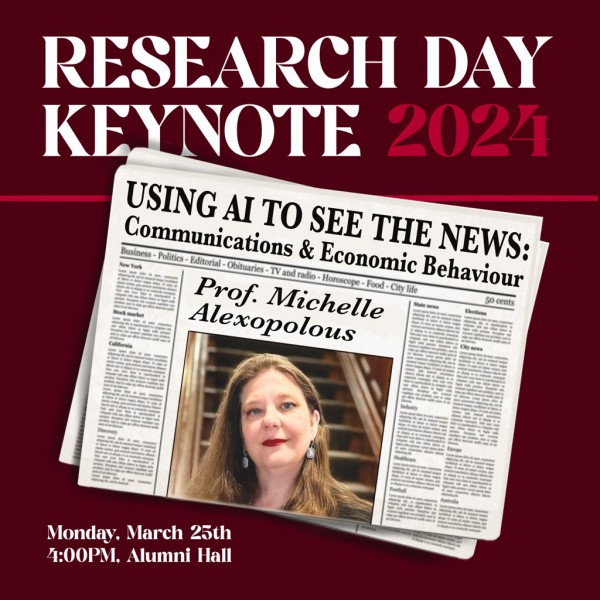
Using AI to See the News: Communications and Economic Behaviour
Psychologists and communication experts tell us that the impact of major economic announcements, such as those made by central banks about monetary policy, should depend a great deal on how the news is delivered. This talk will explain how new techniques in machine learning and AI can help economists analyze the way words, body language and other cues observed during monetary policy communications affect markets, coverage by the media, and ultimately household beliefs about the economy. It will also explore how central banks and others could use this research in the future.
Prof. Michelle Alexopoulos is a Professor of Economics at the University of Toronto with a cross-appointment to the Faculty of Information. She is currently the President of the Canadian Economics Association, a fellow of the Bank of Canada, a Canadian Productivity Partnership collaborator, and a faculty affiliate at the Schwartz Reisman Institute for Technology and Society, the Data Sciences Institute, and the School of Cities at U of T. Alexopoulos is a macroeconomist whose research focuses on business cycles, monetary policy, technical change, economic uncertainty, labour markets and productivity. Her research, supported by numerous public and private grants, has been published in top-tier economics journals and has been presented at numerous central banks, international conferences, academic departments, and the National Academy of Sciences.
5 p.m. – 6 p.m. | Awards Ceremony
Location: Alumni Hall
March 27, 2023 | Research Day 2023
Mar. 27, 202310:00a.m. - 4:00p.m.
Location: Victoria College Alumni Hall/ Foyer
Victoria College’s annual Research Day took place on March 27, 2023. Research Day brings together Vic students from all disciplines and provides an opportunity to share your work with fellow students, professors, and the Vic community.
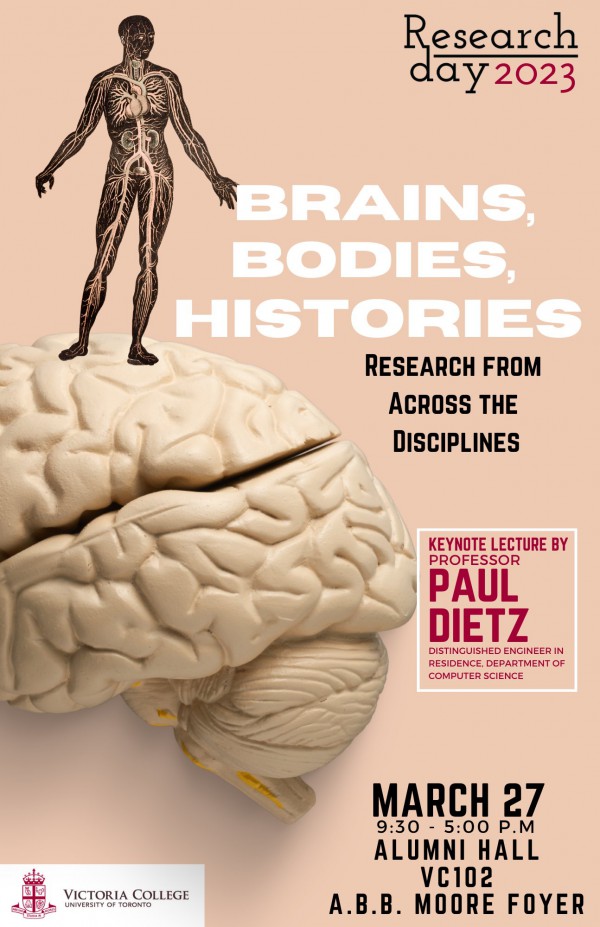
Program
2 p.m. – 3 p.m.| Northrop Frye Centre Undergraduate Fellows Symposium
Location: VC102
Presenters: Daria (Dasha) Diakova, Tara Downie, Khulan Enkhbold, Sam Martin, Madeleine Schmuckle
3:00 p.m. – 4:00 p.m. | Capstone Humanities Symposium
Location: VC102
9:30 a.m. – 5 p.m. | Poster Presentations
Location: A.B.B. Moore Foyer
Selected Vic students or any students enrolled in Victoria College programs who have been conducting research in any discipline will present their research posters.
4 p.m. – 5 p.m. | Keynote Address: "How Talking Raccoons will Save the World: Animatronics, Education, and Community"
Location: Alumni Hall
Speaker: Professor Paul H. Dietz
“How Talking Raccoons Will Save the World”
The Animatronics Workshop is a different sort of school robotics program where kids develop characters, write stories, and bring them to life with their own robotic creations. The workshop, co-founded by Paul Dietz and his wife Cathy, emphasizes teaching kids to work creatively across both technical and artistic disciplines. This talk will describe the history of the program and current efforts to make it accessible to teachers throughout Canada. It will conclude with a brief look at some other projects that use tech to create compelling experiences with the goal of fostering community. Paul Dietz spent most of his career in corporate research, including senior research positions at Walt Disney Imagineering, Mitsubishi Electric and Microsoft. He is best known for his early work on multitouch interfaces – now the primary way we interact with phones, tablets, and many other electronic devices. More recently, he invented a way to create displays which can show different images to each viewer, even when many people are looking at the same display at the same time. He founded Misapplied Sciences to commercialize this technology, which you can now experience at the Detroit airport. It was recently named to Popular Science’s list of the top innovations for 2022. Dietz holds over 75 US patents. Currently, he is a Distinguished Engineer in Residence in Computer Science at the University of Toronto where he is focusing on projects that address societal needs.
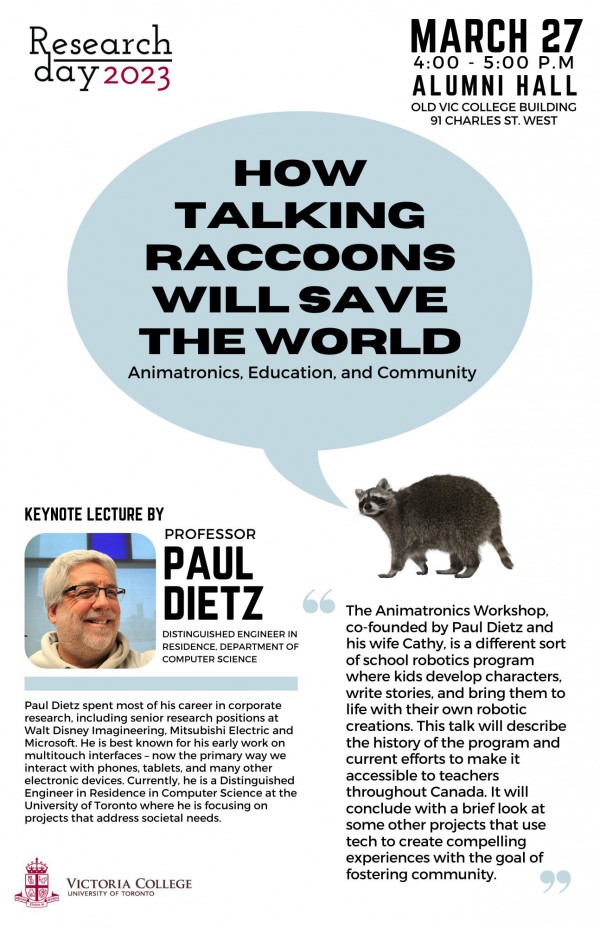
5 p.m. – 6 p.m. | Awards Ceremony
Location: Alumni Hall
March 28, 2022 | Research Day 2022
Victoria College’s annual Research Day took place on March 28th, 2022. Research Day brings together Vic students from all disciplines and provides an opportunity to share your work with fellow students, professors, and the Vic community.
How Research Day will work: The event will take place remotely from 11:00am-4:00pm over ZOOM. Successful applicants will be given a 5-minute time slot to share their work using appropriate visual or video aids to explain their research. Presentations should be aimed at a general audience and must not exceed the 5-minute time limit.
Key Benefits to Students
- Win cash prizes in a range of categories across the sciences and humanities. (Awards include: Principal’s Science Award; Institute for the History and Philosophy of Science and Technology Prize; E. J. Pratt Library Primary Source Research Prize; Student Choice Award)
- Share your work with an interdisciplinary audience of Victoria College students and faculty. Each panel will be chaired by Victoria College faculty
- Include your presentation on your CV and grad school applications
Program
Full Research Day 2022 program
| Time (Eastern Time) | Description |
| 11:05-11:10 AM | Welcome Professor Shaun Ross |
| 11:10-11:15 AM | Opening Remarks President Will Robins |
| 11:15-11:55 AM | Panel #1: Health and Human Flourishing Chair: Professor Paul Gooch Presenters : Madison Hossack, Jihyun Kim, Miranda Chang, Rebeccah Raphael |
| 12:05-12:45 PM | Panel #2: Identities and Relations Chair: Principal Angela Esterhammer Presenters : Baishen Yu, Qilin Yu, Megha Manoj, Jaemin Hwang |
| 1:05-1:55 PM | Panel #3: Material Culture and Local History Chair: Professor Ira Wells Presenters: Kayla Paciocco, Erin Case, Madeleine Schmuckler, Derek Choi, Erika Ashley Couto |
| 2:05-2:45 PM | Panel #4: Animal and Plant Life Chair: Professor Angus McQuibban Presenters: Emilie Nero, Jessie Wang, Savina Cammalleri, Kieran Guimond |
| 3:05-3:45 PM | Panel #5: Technologies and Techniques Chair : Professor Mark Solovey Presenters: Conorr Norquay, Brianna Davies, Cecilia Zhehui Xie, Leila Tjang |
Accessing Research Day 2022 Presentation Recordings
Join us
March 30, 2021 | Victoria College's Virtual Research Day 2021

Victoria College's Virtual Research Day 2021 - Tuesday, March 30, 2021.
Schedule
12:15 PM EST: Welcome and Introductions
Professor Shaun Ross
12:30-1:15 PM EST: Panel #1: Health, Biology, and Technology
Presenters: James Yuan, Benjamin Bangjie Ding, Jessie Wang, Mia Feldman, Hailey Marleau
1:15-2:00 PM EST: Panel #2: Practises and Investigations
Presenters: Zelyn Lee, Leila Tjiang, Elizabeth Wing-Yee Chan, Carlin Henikoff, Zoë Golay
2:00-2:45 PM EST: Panel #3: Communities and Identities
Presenters: James Hannay, Omar Kassam, Para Babuharan, Yana Sadeghi, Maya Blumenthal
2:45-3:30 PM EST: Panel #4: Stories and Communication
Presenters: Ernest Leung, Sukhmani Khaira, Britney Best, Mollie Sheptenko, Elizabeth Coulter, Sherry Li
4:00-5:00 PM EST: Panel #5: Northrop Frye Centre Undergraduate Fellows
Presenters: Cheryl Cheung, Lana Glozic, Ori Gilboa and Kate Schneider
7:00-8:30 PM EST: Panel #6: Undergraduate Research during COVID-19
Presenters: Elly Chen, Cheryl Cheung, Maia Harris, Victoria Ngai, Sarina Nikzad and Christine Sutcliffe
Undergraduate Research at Victoria College
Victoria College is an intellectual community that encourages innovative thinking. One way the College does this is by supporting and promoting opportunities for our undergraduates to pursue independent research projects.
Do you have a research project you want to pursue? Are you looking to connect with faculty-led research projects? Do you want to find out more about research opportunities at Victoria College and the University of Toronto?
Contact Information
Prof. Shaun Ross
Victoria College's Undergraduate Research Coordinator
vic.research@utoronto.ca
Undergraduate Research and Internship Opportunities
Explore research and internship opportunities available to undergraduate students within Victoria College, University of Toronto, and beyond.
